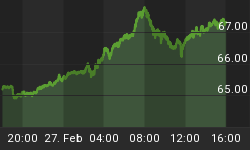A week seldom goes by without us reading somewhere that the US dollar is in danger of losing its reserve currency status. We are now going to argue that the US$ is actually in no such danger, because it can't lose what it doesn't have.
The US$ became the official "reserve currency" in 1944 as a result of the Bretton Woods agreement. Under this agreement, all the major currencies of the world were to have fixed rates of exchange against the US dollar. The idea was that participants in the Bretton Woods system would intervene in the foreign exchange market -- buying/selling their own currency or US$ reserves -- to keep the actual rate of exchange within 1% of the stipulated rate. For its part, the US agreed to make the dollar convertible into gold at the fixed rate of $35/ounce, although the conversion facility was only available to central banks and governments.
With all the major currencies pegged to the US$ it made sense for most international trade to be conducted in dollars and for commodity prices to be quoted in dollars throughout the world.
In summary, the Bretton Woods agreement established a system of payments based on the US$, with all currencies defined in terms of the dollar and with the dollar defined in terms of gold. Under this system the US$ was the world's reserve currency, but gold was the ultimate monetary anchor.
For reasons that we won't regurgitate at this time, the Bretton Woods system was abandoned in the early 1970s in two stages. First, the US government "closed the gold window", meaning that the US reneged on its commitment to link the dollar to gold at the fixed rate of $35/ounce. Second, most central banks stopped trying to maintain fixed exchange rates. The result was an anchorless monetary system of free-floating currencies that persists to this day.
Well over half of the world's currency reserves are still US$-denominated, but this is not because the US$ is still the "reserve currency". The accumulation of US$ reserves over the past decade has mostly been associated with the mercantilist trade policies of China, Japan, and other Asian governments. This official-sector accumulation of dollars will continue as long as the political leaders of these countries believe that they can gain an economic advantage via a weaker currency. Refer to our article titled "Nobody wants a strong currency" for additional thoughts on this issue.
Also, a lot of international trade is still US$-denominated and commodity prices are still generally quoted in dollars throughout the world, but this happens for reasons of convenience and efficiency. It doesn't happen because the US$ has something called "reserve currency status". The fact is that the US$ is by far the most widely accepted currency in the world.
The upshot is that under the current monetary system there is no official reserve currency. It therefore isn't possible for the US$ to become less valuable as a consequence of losing "reserve currency status".
We aren't offering a free trial subscription at this time, but free samples of our work (excerpts from our regular commentaries) can be viewed at: http://www.speculative-investor.com/new/freesamples.html















